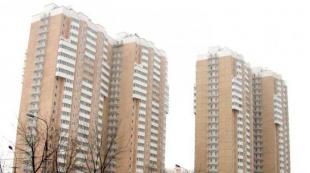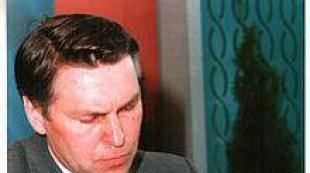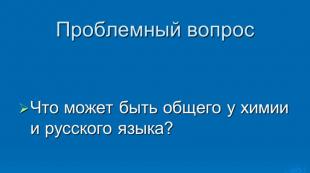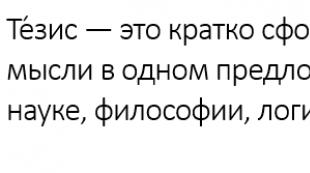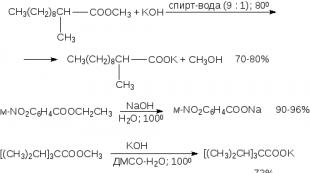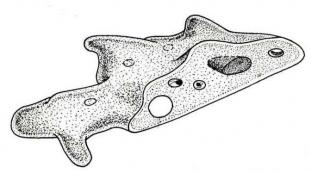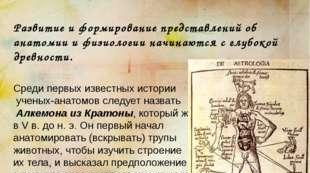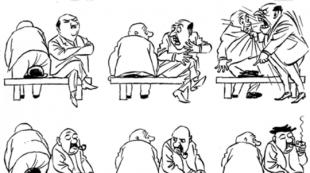Ministry of Education and Science of the Russian Federation. Ministry of Science and Higher Education of the Russian Federation (Ministry of Education and Science of Russia). Ministry of General and Vocational Education
With the collapse of the Soviet Union, in November 1991, the current Ministry of Education of the RSFSR was transformed. On its basis, by combining several more republican committees, the Ministry of Education of the RSFSR was created. And at the end of December, the name of the state changed. And the ministry was renamed the Ministry of Education of the Russian Federation.
All names of the Ministers of Education of Russia
The Ministry of Education of the Russian Federation is a state authority whose activity is the implementation of the state policy on normative and legal regulation in the field of science, public education, youth policy, guardianship and guardianship, social protection and support for pupils of educational institutions.
During the twenty-six years of the existence of the new Russia, 8 people have held the post of Minister of Education of Russia.
Period of employment |
||
E. D. Dneprov | From 07.1990 to 12.1992 |
|
E. V. Tkachenko | From 12.1992 to 08.1996 |
|
V. G. Kinelev | From 08.1996 to 02.1998 |
|
A. N. Tikhonov | From 02.1998 to 09.1998 |
|
V. M. Filippov | From 09.1998 to 03.2004 |
|
A. A. Fursenko | From 03.2004 to 05.2012 |
|
D. V. Livanov | From 05.2012 to 08.2016 |
|
O. Yu. Vasilyeva | August 2016 to present. |
All the Ministers of Education of Russia, each in his time, made a great contribution to the preservation and development of the system of education of the country's population.
The first elected Minister of Education of the Russian Federation
Eduard Dmitrievich Dneprov - academician, doctor of ped. Sciences, Candidate of Historical Sciences. He is rightfully considered a reformer of Russian education during the formation of the newly formed state.
The burden of reorganizing the Ministry of Education of the RSFSR into the Ministry of Education of Russia fell on his shoulders. Since December 1992, there was Yeltsin B. N. Dneprov E. D. - the author of many works on the history of Russian pedagogy and school.
Second Minister
After Eduard Dneprov, the ministry was headed by E. V. Tkachenko, who had previously worked as the rector of the Sverdlovsk Institute of Institute of Psychology, professor, doctor of chemical sciences. Having become a minister, he announced a moratorium on the privatization of all property in all structures of the ministry. He was a supporter of the humanization and democratization of education.
Ministry of General and Vocational Education
In August 1996, the State Committee for Higher Education of the Russian Federation was abolished. Its functions were transferred to the Ministry of Education, at the same time changing the name of the ministry. On August 14, it became the Ministry of General and Vocational Education. V. G. Kinelev was appointed minister.
From February to the end of September 1998, the post of Minister was held by the former First Deputy Minister of Education of Russia A. - Doctor of Technical Sciences, Academician. He is known for his work on materials science in space and radiation fields. Since October 1998, he moved to work on the methodological and scientific support of informatization of schools and colleges of the country, the methodology for the application of information technologies in the educational and scientific sphere.
Filippov V. M.
In September 1998, M. was appointed minister. Prior to that, he was the rector of the famous RUDN University. He came to the government together with Primakov E.M.

Together with Deputy Prime Minister Matvienko V.I., he began work to stabilize the situation in the field of education and upbringing, paying special attention to reducing wage arrears to school teachers and kindergarten teachers.
The Ministry of General and Vocational Education in May 1999 was renamed the Ministry of Education of the Russian Federation. In the same year, the state program for the development and improvement of the system for the period up to 2004 was approved. At the initiative of Filippov, an active renewal of the system and principles of education has begun. At the beginning of 2000, Filippov held the Congress of Teachers and Educators of Russia in Moscow, which the previous ministers did not hold.
Vladimir Mikhailovich carried out an almost complete modernization of the education system. Provided schools with buses, carried out informatization in educational institutions, new standards of general education were developed and introduced. The gradual introduction of the Unified State Examination has begun. The system of recruiting students to the country's universities on the basis of university, regional and all-Russian Olympiads began to work. The rules for the targeted quota sending of young people to study at certain higher educational institutions and much more have been approved.
Ministry of Education and Science of Russia
In 2004, Prime Minister M. Fradkov transferred A. A. Fursenko from the Ministry of Industry to the Ministry of Education and Science.

The Minister of Education and Science of Russia (now this is the name of the Ministry) began its activities by continuing the reforms initiated by Filippov. Under him, the Unified State Examination was finally put into effect in all eleventh grades. Higher education has become two-level: undergraduate and graduate. In 2012, when V. Putin again became President, Fursenko went to work in his apparatus.
The rector of MISiS was appointed to the vacant seat. He was a supporter of reducing the number of universities. He proposed to deprive all inefficient higher education institutions of licenses from budget financing.
minister today

Who is the Minister of Education of Russia now? Since August 2016, this position has been held by Olga Vasilyeva, Doctor of Historical Sciences. For a year of work in the entrusted position, she proved herself, like all previous ministers of education in Russia, as an official who cares for the prosperity of domestic science and education.
On May 18, 2018, a new composition of the Government began its work in Russia. Most of the ministers continued their activities in the posts they held in the previous government, but there are certain changes in the composition of the Cabinet of Ministers.
For example, the former Ministry of Education and Science was reformatted, as a result of which two departments were formed at once - the Ministry of Education, which was headed by the former Minister of Education Olga Vasilyeva, and the Ministry of Science and Higher Education, which was joined by a new person who had not previously worked in the government . The new Minister of Education of Russia in 2018, who is this person, why exactly did he head the newly formed ministry.
With the beginning of the work of the new government, it became clear that there would no longer be a single Ministry of Education. Instead, two new structures have been established - the Ministry of Education and the Ministry of Science and Higher Education. This division was approved by President Vladimir Putin at the suggestion of Prime Minister Dmitry Medvedev, thus dividing the responsibilities of departments. The first will be responsible for schools and secondary education, the second - for the science of innovation and the activities of higher educational institutions.
According to Medvedev, the reorganization will make it possible to better concentrate the state's opportunities for the development of both education systems.
According to experts, the idea of uniting all levels of the educational system under the wing of one agency turned out to be erroneous. The result of such actions was a serious decline in the level of educational training in colleges and the widespread orientation of all students to receive exclusively higher education. Thus, changes in the management of the education system are long overdue.
At first glance, the separation of a single department responsible for education looks like a return to the experience of the Soviet Union, when there were also several educational departments. However, in reality, the reorganization could be required not at all because of the need to save Russian education and science, but simply in order to equally share power among all lobbyists.
Practice clearly demonstrates that in Russia all kinds of reshuffles in the Government do not have a fundamental impact on the policy pursued by the state. According to historian Yevgeny Spitsyn, in the case of the division of the Ministry of Education, there is a struggle between various groups of influence who want to gain control over certain areas of government and cash flows. There is a serious apparatus struggle, on which a large number of interests and purely political motives are tied.
Thus, in order to comply with the interests of all groups of influence, it was decided that Olga Vasilyeva, against whom a serious campaign had been conducted recently, should head the new Ministry of Education, since she was really better at working with the “school” block of secondary education, but representatives of the liberal block of influence received higher education and science at the mercy of them. The Ministry of Science and Higher Education was headed by Mikhail Kotyukov, who previously worked as the head of the Federal Agency for Scientific Organizations.
Mikhail Kotyukov, who headed the newly formed Ministry of Science and Higher Education, was born in 1976 in Krasnoyarsk. He received primary and secondary education in a regular comprehensive school No. 68. Then he entered the Krasnoyarsk State University, where he graduated with a degree in Finance and Credit.
It is believed that Valery Zubov, the former dean of the Krasnoyarsk State University, who became the governor of the Krasnoyarsk region and called Mikhail to work in the regional administration before graduating from the university, gave Kotyukov a ticket to official life. After graduating from higher education, Mikhail Kotyukov received a promotion, becoming the head of the control and audit department of the Main Financial Department of the regional administration.
In 2001, Mikhail Kotyukov changed the civil service to private business, becoming the head of the financial department at Krasnoyarskagropromdorstroy OJSC. However, a year later he returned to the regional administration under the leadership of the new governor of the region Alexander Khloponin. Kotyukov was accepted as the chief specialist of the resource analysis and budget policy department of the Main Directorate of Economics and Planning. After another 2 years, Mikhail Mikhailovich sat in the chair of the deputy head of the Main Financial Department.
In 2007, after the scandalous poisoning of students at a ball for excellent students, Kotyukov was included in the list of officials who left their posts. This version was discussed by the Krasnoyarsk media, however, there was no evidence to confirm the connection between the events. Another event that could have caused Kotyukov to leave was the audit of the financial activities of the Krasnoyarsk Territory by the Accounts Chamber. As a result of the investigation, unreasonable expenses and debts to employees were discovered.
In March of the same year, Mikhail Kotyukov worked for a short time at the Siberian Federal University, in order to soon return to the civil service in the regional administration.
In 2010, Kotyukov, a loyal member of Alexander Khloponin's team, moved to the capital together with his boss, becoming the head of the budget policy department in the social sphere and science of the Ministry of Finance of the Russian Federation.
In 2012, Kotyukov became Deputy Minister of Finance of the Russian Federation, supervising the financing of the social sector, including science, according to the Ros-Register portal. since 2013, Mikhail Kotyukov has become the head of the newly formed Federal Agency for Scientific Organizations (FANO).
In this position, Kotyukov was involved in the development of principles for evaluating the effectiveness of scientific institutions in Russia, as well as the inventory of property, the Russian Academy of Sciences.
Such interference in the affairs of the academy provoked a huge flow of negative criticism against Kotyukov. He was accused by academicians of the Russian Academy of Sciences of excessive bureaucracy and interference in scientific affairs.
In addition to his activities as the head of FANO, Kotyukov was also involved in reforming the pension system and the work of the Olimpstroy corporation, which was engaged in the construction of facilities for the Sochi Olympics.
Thus, by the age of 41, Mikhail Kotyukov has a very extensive work list, which is replete with departures and returns of the new Minister of Education of Russia in 2018 to the public service. Whether this is good or bad, only time will tell. As the experience of the previous government shows, Kotyukov has every chance of staying in the civil service for another 6 years.
Media news
Partner news
According to the above document, since May 15, 2018, the Ministry of Education and Science has been divided into 3 separate departments:
- Ministry of Education of the Russian Federation
- Ministry of Science and Higher Education of the Russian Federation
- Rosobrnadzor
History of divisions and associations of Ministries of Education in Russia?
- 1946: It is necessary to focus on the very name of the future ministry. In the history of Russia, the department dealing with education was called the "Ministry of Education" 2 times: in Tsarist Russia (Ministry of Public Education - since 1802, in Soviet Russia (Ministry of Education of the RSFSR) - since 1946.
- 1988: In 1988, the Ministry of Education of the RSFSR appeared in Russia. For this, two departments were united: the State Committee of the RSFSR for Vocational Education and the Ministry of Education of the RSFSR.
- From 1988 to 1996 in Russia, the Ministry of Education of the RSFSR, and then the Russian Federation, was responsible for primary and secondary (including secondary specialized and vocational) education in the Russian Federation.
- The Ministry of Science, Higher Education and Technical Policy of the Russian Federation (and then the State Committee of the Russian Federation for Higher Education) was responsible for higher and postgraduate education and science.
- 1996: From 1996 to 1999 - Ministry of General and Vocational Education of the Russian Federation
- year 2000: From 2000 to 2015 - Ministry of Education of the Russian Federation (Ministry of Education and Science)
The division of the education sector of the USSR into several departments
As for the division of departments at the all-Union level, the education sector of the USSR was supervised by 3 separate departments:
- Ministry of Higher and Secondary Specialized Education (Minvuz) of the USSR,
- USSR Ministry of Education,
- Ministry of Vocational Education of the USSR.
What will the Ministry of Education do?
From May 15, 2018, the new Ministry of Education will implement state policy and legal regulation in the areas of:
- general education,
- secondary vocational education
- vocational training,
- additional education for children and adults,
- education.
According to preliminary information, the post of Minister of Education will be taken by former Minister of Education Olga Vasilyeva.
What will the Ministry of Science and Higher Education of the Russian Federation do?
Functions for the development and implementation of state policy and legal regulation in the field of
- higher education,
- relevant additional professional education,
- scientific, scientific, technical and innovative activities,
- nanotechnology,
- development of federal centers of science and high technologies,
- state scientific centers and science cities.
Ministry of Education through the prism of history
Before the revolution in tsarist Russia, the Ministry of Education was headed by 29 ministers.
After the revolution, the People's Commissariat of Education was created, which was headed by people's commissars:
- 1917 – 1929 : Lunacharsky Anatoly Vasilyevich, the only one from the government who held the post for 12 years, the founder of the journal Educational Bulletin.
- 1929 – 1937 : Andrey Sergeevich Bubnov, introduced universal primary education, shot in 1938.
- 1937 – 1940 : Tyurkin Petr Andreevich, holder of the Order of the Red Banner, arrested in the "Leningrad case" and posthumously rehabilitated in 1954.
- 1940 – 1946: Potemkin Vladimir Petrovich, professor of history, organizer of the Academy of Pedagogical Sciences of the RSFSR.
Since 1946, Narkompros has been reorganized into the Ministry of Education.
- 1946 - 1947 : Aleksey Georgievich Kalashnikov, Doctor of Physical and Mathematical Sciences, Professor.
- 1947 – 1949 : Voznesensky Alexander Alekseevich, academician, rector of Leningrad University, shot in 1950 in the "Leningrad case". Rehabilitated in 1954
- 1949 – 1956 : Kairov Ivan Andreevich, President of the Academy of Pedagogical Sciences.
- 1956 – 1967 : Evgeny Ivanovich Afanasenko, was a supporter of anti-academicism, which led to a decrease in the quality of education.
- 1967 – 1980 : Danilov Alexander Ivanovich, the transition to universal secondary education has been carried out.
- 1980 – 1990 : Veselov Georgy Petrovich, variable curricula have been introduced.
After the collapse of the USSR, the Ministry of Education became known as the Ministry of General and Vocational Education of the Russian Federation. Since 2000 - Ministry of Education and Science (Ministry of Education and Science of Russia).
- 1990 – 1992 : Dneprov Eduard Dmitrievich , the first Minister of Education of modern Russia. Academician of the Russian Academy of Sciences.
- 1992 – 1996 : Tkachenko Evgeny Viktorovich, sought to return Russian science to the international stage.
- 1996 – 1998 : Kinelev Vladimir Georgievich, Doctor of Technical Sciences, one of the founding fathers of distance learning in Russia.
- 1998 Tikhonov Alexander Nikolaevich, initiator of the development of Russian scientific and educational networks included in the Internet - RunNet, RBNet, Relarn-IP, etc. One of the first ideologists of distance education in Russia.
- 1998-2004 : Filippov Vladimir Mikhailovich, Doctor of Physical and Mathematical Sciences, Professor. Implemented a computerization program for rural schools.
- 2004 – 2012 : Andrey Fursenko, transferred higher education to the principles of the Bologna system (bachelor's and master's programs), introduced the Unified State Examination.
- 2012 -2016 : Livanov Dmitry Viktorovich, Doctor of Physical and Mathematical Sciences, reformed the Russian Academy of Sciences, merged universities, initiated investigations of "fake" dissertations among officials.
- 2016 – 2018 : Vasilyeva Olga Yuryevna, Doctor of Historical Sciences, the first woman minister of education, except for Nadezhda Konstantinovna Krupskaya, who officially was not the people's commissar of education, but actually led the educational policy in the country.
WITH 2018, the Ministry of Education and Science of the Russian Federation was divided into 2 main departments:
The former head of the department, Olga Yuryevna Vasilyeva, has been appointed Minister of Education.
Mikhail Mikhailovich Kotyukov, former head of the Federal Agency for Scientific Organizations, has been appointed Minister of Science and Higher Education. In the past, Kotyukov M.M. held such positions as Vice-Rector for Economics and Finance of the Siberian Federal University, Head of the Department of Finance of the Krasnoyarsk Territory, Minister of Finance of the Krasnoyarsk Territory, Deputy Minister of Finance A. Siluanova.
The Ministry of Education and Science of Russia is now divided into two departments - the Ministry of Education and the Ministry of Science and Higher Education. The portal profiok.com talks about why this was done and what tasks the new departments face.
Historical continuity In 1802, Emperor Alexander I issued a manifesto on the establishment in Russia of the Ministry of Education in order to "educate youth and disseminate science." In other words, for the first time this phrase was heard in our country more than two hundred years ago. During this period, of course, reforms were carried out: education was either combined with culture or science, then again these areas were separated.
After the collapse of the USSR, education was again combined with the scientific sphere. The Ministry of Education and Science dealt with kindergartens, universities, and the regulation of scientific activities. No matter how you build a management policy, it is difficult to form a single strategy that simultaneously leads to two different goals. But the goals are really different: for example, higher education and science hunt for talents, while schools and kindergartens should strive to give equal opportunities to everyone.
A vivid example is the attack on the Unified State Exam, undertaken by representatives of the Russian Academy of Sciences at the end of April. From the point of view of officials, the Unified State Examination is a social lift, an opportunity for a person from the outback to get into a metropolitan university. Academicians, on the contrary, believe that the USE kills creativity: it is not by chance that the winners of the Olympiads do not always pass the unified exam well. The fact that Olympiad geniuses are not doing well with the Unified State Examination, Olga Vasilyeva also noticed. True, she drew a different conclusion: apparently, something is not clean with these Olympiads, since their winners are not able to answer elementary questions on specialized subjects.
And so in everything. According to Olga Vasilyeva, the task of the school is to educate a person and provide him with high-quality basic knowledge, regardless of which school he studies at. Everything else - extended textbooks, additional classes, circles and sections - is possible, but not instead of, but in addition to the basic program. Mastered the basic - expand knowledge.
In a word, a separate department has now been created for each of the global tasks. "This will allow us to better concentrate our opportunities for the development of both one education system and another education system," Dmitry Medvedev explained to the president the meaning of the reform in a peculiar but intelligible way. The Ministry of Education will deal with general and secondary vocational education, additional education and vocational training for workers of all ages. The Ministry of Science and Higher Education got universities, science cities, research centers, innovations, and so on.
Rosmolodezh and Rosobrnadzor now report directly to the government. Recall that the supervising Deputy Prime Minister in this area is Tatyana Golikova, who previously headed the Accounts Chamber of the Russian Federation.
Universities and Science The endless history of the reform of the Russian Academy of Sciences has shown that the system of science management in our country is still tight. Taking into account the tasks set by the president, that is, the need for a technological and scientific breakthrough, this could no longer continue. A separate department was supposed to appear in the country, which would coordinate the development of university and academic science.
The new Ministry of Science and Higher Education was created on the basis of the liquidated Federal Agency for Scientific Organizations (FANO). The post of minister was given to the head of FASO Mikhail Kotyukov. When FANO was created, the idea was to separate property management and actual scientific work. In the course of the reform of the Russian Academy of Sciences, these spheres diverged so far that the development of science stalled. Now, as we see, a new attempt is being made to build a system of science management. It is noteworthy that within the framework of one department there was a bunch of science and higher education. This means that the state is making a serious bet on the development of university and youth science - for example, postgraduate studies.
The May decree states that by 2024 our country should enter the top five countries in the world that carry out scientific developments in areas determined by the priorities of scientific and technological development. In addition, it is necessary to increase funding for science "from all sources" (that is, not only from the budget), as well as to make work in Russia attractive to domestic and foreign researchers and scientists. For this, megascience projects will be developed, scientific and educational centers will be created, and the material and technical base of scientific organizations will be updated. Finally, an integral system of training and professional growth of scientific personnel should be formed.
The head of the Russian Academy of Sciences Alexander Sergeev expressed satisfaction with the fact that the May decree included many ideas of the representatives of the academy. After the adoption of amendments to the law on the Russian Academy of Sciences, the Academy of Sciences received the authority to coordinate all fundamental science in the country, regardless of where exactly the research is being conducted. I would like to believe that the reform of the science management system will significantly increase the efficiency of scientific research, and this efficiency will be measured in more tangible indicators than citation indices in scientific journals, which everyone has long learned to wind up.
Education
I must say, judging by Olga Vasilyeva's public speeches, the topic of managing scientific development has always been somewhat further from her than teaching and educating schoolchildren. When the minister switches from mega-science projects to learning music, playing chess, or just saying the word "kids", her tone changes noticeably. It is probably right that a person working as a minister will henceforth be completely immersed in tasks, the range of which is determined not only by official duty, but also by emotional attachment.
According to the May decree of 05/07/2018, in six years Russia should enter the top ten countries in the world in terms of the quality of general education. It is assumed that for this, new technologies and teaching methods will be introduced at all levels, and the quality and accessibility of education will be ensured.
At the same time, attention will be paid to both kindergarten students and working citizens who want to update their professional skills and competencies, including, for example, "digital" knowledge and skills.
The Ministry will create conditions for the early development of children under three years of age, identify and develop abilities in children and young people (for all, and not just gifted children in elite schools - approx. profiok.com), will be engaged in career guidance, the development of volunteering and mentoring. A separate task is to ensure the professional development of teachers: by 2024, at least every second teacher should be involved in the system of professional growth. The department also faces the task of modernizing the sphere of vocational education and deploying a system of professional skill competitions, which will open career opportunities for citizens. In addition, the tasks in the field of education include "the upbringing of a harmoniously developed and socially responsible personality based on the spiritual and moral values of the peoples of the Russian Federation, historical and national-cultural traditions."
The head of the Cabinet of Ministers, Dmitry Medvedev, instructed all departments by June 29, 2018 to develop the dynamics of target indicators in the areas related to them, mentioned in the May decree, to clarify the lists of tasks, to determine "milestones" (control points) and responsible. Draft national programs will appear later - in mid-August, action plans for their implementation - by the end of September.
Therefore, there are no specifics yet, of course. But it seems that the 5-100 project, on whose effectiveness Olga Vasilyeva and Deputy Prime Minister Olga Golodets differed so radically, does not appear anywhere. Most likely, this is for the best: we do not need positions in the rankings, but a decent level of education throughout the country. On May 24, Olga Vasilyeva came to the "Last Bell" in her native school. "Our main goal is enlightenment in Russia, which will affect different levels of education, including adult education," - this is how she formulated the main tasks of the Ministry of Education in a conversation with teachers, adding that in the strategic tasks set by the president, much attention is paid to education .
So, the Ministry of Science and Higher Education will train personnel for a technological breakthrough, and will also create conditions for this very breakthrough, increasing the efficiency of scientific research. The main task of the Ministry of Education is to form a nation, creating equal conditions for everyone, getting rid of the "values" of the 1990s, teaching children to work, respect each other, love their country and their culture. These are fundamentally different goals, and it is unlikely that anyone will undertake to determine which of them is more important.
Interdepartmental interaction
Separation of "Siamese twins" is a complex and responsible operation. The reorganization of the Ministry of Education and Science will last until the end of the financial year, and from January 2019, each of the new ministries will begin its own independent life. But separating spheres of influence and responsibility is not so easy. Which department, for example, will pedagogical institutes belong to? Probably, it would be logical to give them to the Ministry of Education, since it deals with teachers, but then they may eventually “fall out” of the Russian system of higher education.
There are questions about the exam. Until now, through the efforts of the previous leaders of the Ministry of Education and Science, studying at school was perceived solely as preparation for entering a university. Now the situation is changing, and getting a working profession, as well as studying at a college or technical school instead of an institute, no longer looks like a collapse of a career at its very start. Maybe it's time to reconsider the approach to the exam and not force those who are not going to continue their studies at the university to take it?
On the other hand, vocational guidance now begins, as a rule, from school years, if not from kindergarten. In many schools there are specialized classes, training in which guarantees admission to a particular university. In short, the new departments have many points of contact, and the effectiveness of their work will depend, among other things, on how quickly they can achieve a common vision and understanding of each other's goals and objectives.
Introducing the new ministers Olga Vasilyeva and Mikhail Kotyukov to the staff of the Ministry of Education and Science and FASO, Deputy Prime Minister Tatyana Golikova stressed that it is important to work on strategic tasks in a coordinated and joint manner, and initiatives "in sensitive areas" should be discussed with society and experts. In response, both ministers assured that they were committed to constructive cooperation.
"I believe that the formation of teams, a friendly environment in our socio-economic bloc is important, because if like-minded people work, everything works out," Golikova concluded.
Law on the reform of the Russian Academy of Sciences: the process of destruction continues...
Six years ago, on September 27, 2013, the federal law "On the Russian Academy of Sciences, the reorganization of state academies of sciences..." was signed. Today we are summing up the sad results of the process of destruction of the Russian Academy of Sciences, which, alas, continues.
On the consequences of new approaches to organizing contacts with foreign scientists
The order of the Ministry of Education and Science to regulate contacts between Russian scientists and foreigners could undermine the implementation of major government programs: the “5/100 program”, aimed at building the capacity of Russian universities, and the mega-grant program.
Science was discussed at the St. Petersburg International Economic Forum
What gaps do Russian science need to overcome, what is more important - the discoveries of individual scientists or scientific groups, what prevents business from accepting many of the ideas of modern scientists? Representatives of science, government and business spoke about this and many other things at the session "Great Challenges - an incentive for the development of science" of the St. Petersburg International Economic Forum 2017.
The tasks of the national project "Science" can be achieved thanks to the efforts of the Russian Academy of Sciences and the Ministry of Education and Science
The tasks set in the national project "Science" can be solved thanks to the well-coordinated joint work of the Russian Academy of Sciences (RAS) and the Ministry of Science and Higher Education (Minobranuki) of the Russian Federation, Head of the Ministry of Education and Science Mikhail Kotyukov said at a general meeting of the RAS.
The attention of officials to the research of scientists turns into only an increase in bureaucratic pressure
Russian President Vladimir Putin spoke about plans to lure the most successful Russian scientists back to Russia. Elected in September 2017, the new president of the Russian Academy of Sciences, Alexander Sergeev, energetically set to work (the two presidents met last January and were pleased with each other).
, st. Tverskaya, 11
55°45′37″ N sh. 37°36′33″ E d. HGIOL
Ministry of Education and Science of the Russian Federation (Ministry of Education and Science of Russia) - the federal executive body of Russia, which operated in 2004-2018 (and earlier in 1996-1999) and carried out the functions of developing state policy and legal regulation in the field of education, scientific, scientific, technical and innovative activities, development federal centers of science and high technologies, state scientific centers and science cities, intellectual property, as well as in the field of youth policy, education, guardianship and guardianship, social support and social protection of students and pupils of educational institutions.
It ceased to exist due to the division into two departments: the Ministry of Education of the Russian Federation and the Ministry of Science and Higher Education of the Russian Federation.
Encyclopedic YouTube
1 / 5
✪ Film for the Ministry of Education and Science of the Russian Federation
✪ "An hour with the minister" - Minister of Education and Science of the Russian Federation Olga Yuryevna Vasilyeva
✪ Round table of the Department of Science and Technology of the Ministry of Education and Science of the Russian Federation
✪ Minister of Education and Science of the Russian Federation Vasilyeva O.Yu. at PMOF-2018
Subtitles
Story
The Ministry of Education and Science of the Russian Federation (Ministry of Education and Science of Russia) was formed in 2004 and was the legal successor of the Ministry of Education of the Russian Federation, transformed in 1999 from the Ministry of Education and Science of the Russian Federation (1996-1999), which was formed from two departments: until 1996, the initial and secondary (including secondary specialized and vocational) education was managed by the Ministry of Education of the Russian Federation (1991-1996), and higher and postgraduate education and science - by the State Committee of the Russian Federation for Higher Education (1993-1996) and the Ministry of Science, Higher school and technical policy Russian Federation (1991−1993). The latter was reorganized (by transferring higher education issues to it from the Ministry of Education) from the Ministry of Science and Technical Policy of the RSFSR, which existed for only two weeks in November 1991, which united the departments of the USSR and the RSFSR: the State Committee of the RSFSR for Science and Higher Education, the State Committee of the USSR on science and technology. The Ministry of Education of the RSFSR (later the Russian Federation), established in 1988 (with the merger of the Ministry of Education of the RSFSR and the State Committee of the RSFSR for Vocational Education), became the legal successor of the collapse of the USSR in 1991:
- USSR State Committee for Public Education (-), formed as a result of the merger of three ministries of the USSR:
- Ministry higher and secondary special education USSR (Ministry of higher education of the USSR)
- Ministry of Vocational Education of the USSR.
The Ministry was formed during the creation of the first government Fradkov by Decree of the President of the Russian Federation No. 314 of March 9, 2004. The functions of adopting regulations of the Ministry of Education of the Russian Federation abolished by the same decree, as well as the functions of adopting regulations of the abolished Ministry of Industry, Science and Technology of the Russian Federation (in the field of science) and the reorganized Russian Agency for Trademarks, were transferred to it.
At the same time, the functions of law enforcement, management and control in the areas of education, science and intellectual property were transferred to the jurisdiction of the four federal services and agencies under the control of the Ministry, the Federal Agency for Education, the Federal Agency for Science, the Federal Service for Intellectual Property, Patents and Trademarks. signs and the Federal Service for Supervision in the field of education and science.
On the same day, Andrey Aleksandrovich Fursenko was appointed minister, who since November 2003 had been acting minister of industry, science and technology of the Russian Federation.
Decree of the Government of the Russian Federation No. 158 dated April 6, 2004 established the number of the central office of the ministry - 380 people - and the addresses of its location: Tverskaya street, house No. 11/4; Bryusov lane, house number 21, building 1 and 2; Chistoprudny Boulevard, house number 6 (the Federal Agency for Education was located in the building of the former Ministry of Education of the Russian Federation on Lyusinovskaya Street). It was also found that the central office has 6 departments in the main areas of activity, and the minister has two deputies.
On May 20, 2004, the Federal Agency for Science subordinate to the ministry was renamed into.
On August 13, 2005, an additional post of Secretary of State - Deputy Minister was established.
On August 18, 2008, the number of deputy ministers was increased to five, the head office to 430 people, and the number of departments to seven.
On May 15, 2010, the number of deputy ministers was increased to seven, the head office to 850 people, and the number of departments to eighteen.
Under the auspices of the Ministry and the Federal Agency for Education, the All-Russian Olympiad for schoolchildren is held in 21 subjects (2007 data). The Russian Ministry of Education and Science coordinates the implementation of the Priority National Project Education .
According to the decree of the President of the Russian Federation of March 4, 2010 (entered into force on March 10), the Federal Agency for Education (Rosobrazovanie) and the Federal Agency for Science and Innovation (Rosnauka) were abolished with the transfer of their functions directly to the Ministry of Education and Science.
According to the decree of the President of the Russian Federation dated May 24, 2011, the Federal Service for Intellectual Property, Patents and Trademarks was renamed the Federal Service for Intellectual Property and removed from the subordination of the Ministry of Education and Science of Russia along with the expansion of the range of issues regulated by it.
In the second half of the 2010s, the idea of dividing the Ministry of Education and Science into two departments was periodically voiced: one responsible for education, the other for science.
On May 15, 2018, the Ministry of Education and Science was divided into two separate ministries - the Ministry of Education and the Ministry of Science and Higher Education. Rosobrnadzor and Rosmolodezh were transferred to the control of the Government of the Russian Federation.
Competence of the Ministry of Education and Science of Russia
The Ministry of Education and Science of Russia regulates in the following areas:
- scientific, scientific and technical activities and innovative activities in the scientific and technical field;
- development of federal centers of science and high technologies;
- state scientific centers and science cities;
- education, guardianship and guardianship of minor citizens;
- social support and social protection of students and pupils of educational institutions;
- unique scientific stands and installations;
- national research computer network of a new generation and information support of scientific, scientific-technical and innovative activities.
Management
Ministers
Deputy Ministers
- Fridlyanov, Vladimir Nikolaevich (April 5, 2004 - May 15, 2010)
- Svinarenko, Andrey Gennadievich (April 8, 2004 - March 22, 2007)
- Livanov, Dmitry Viktorovich (November 19, 2005 - March 27, 2007) - Secretary of State
- Sentyurin, Yuri Petrovich (April 27, 2007 - November 11, 2010; until June 16, 2010 - Secretary of State)
- Kalina, Isaak Iosifovich (September 11, 2007 - November 9, 2010)
- Miklushevsky, Vladimir Vladimirovich (September 1, 2008 - October 19, 2010)
- Khlunov, Alexander Vitalievich (September 1, 2008 - February 8, 2010)
- Ponomarev, Alexey Konstantinovich (June 9, 2010 - April 17, 2012)
- Mazurenko, Sergey Nikolaevich (March 25, 2010 - June 7, 2012)
- Bilenkina, Inna Petrovna (June 15, 2010 - August 1, 2012)
- Lobanov, Ivan Vasilyevich (June 16, 2010 - January 28, 2011) - Secretary of State
- Kambolov, Marat Arkadyevich (November 12, 2010 - August 2, 2014)
- Dulinov, Maxim Viktorovich (November 17, 2010 - June 9, 2012)
- Remorenko, Igor Mikhailovich (February 3, 2011 - July 20, 2013; until June 5, 2012 - Secretary of State)
- Klimov, Alexander Alekseevich (June 14, 2012 - September 9, 2016)
- Fedyukin, Igor Igorevich (June 14, 2012 - June 6, 2013)
- Povalko, Alexander Borisovich (June 18, 2012 - December 15, 2016)
- Tretyak, Natalya Vladimirovna (June 18, 2012 - December 8, 2016; until August 2, 2013 - Secretary of State, after - First Deputy)
- Tolstikova, Ekaterina Andreevna (September 11, 2014 - November 12, 2016)
- Pereverzeva, Valentina Viktorovna (since March 22, 2017) - First Deputy
- Kaganov, Veniamin Shaevich (since June 25, 2013)
- Ogorodova, Lyudmila Mikhailovna (since August 26, 2013)
- Kuznetsova, Irina Vladimirovna (since December 1, 2016)
- Trubnikov, Grigory Vladimirovich (since January 25, 2017)
- Zenkovich, Pavel Stanislavovich (since February 6, 2017) - Secretary of State
- Sinyugina, Tatyana Yurievna (since March 25, 2017)
The structure of the central office
Departmental awards (description)
Medal of L. S. Vygotsky
Medal of L. S. Vygotsky- departmental medal of the Ministry of Education and Science of the Russian Federation, established by order of the Ministry of Education and Science of Russia No. 546 of May 12, 2016 (clarifications were made by order No. 1223 of September 26, 2016). The establishment of the medal was associated with the celebration of the 120th anniversary of the birth of L. S. Vygotsky, who made a significant contribution to the development of the sciences of human development in nature, culture and society.
Award procedure
The L. S. Vygotsky Medal is awarded to citizens of the Russian Federation from among pedagogical workers and figures in the field of psychological sciences who have the degree of candidate or doctor of science and carry out scientific or educational activities (hereinafter referred to as employees) who have made a significant contribution:
in the development of a cultural-historical approach in psychology; in improving the methods of psychological and pedagogical support of citizens; in scientific and methodological support of psychological support. The medal is awarded to employees who have at least 20 years of work experience in the field of psychological sciences, including at least 5 years in the educational or scientific organization submitting the award.
Description of the badge of the award
The medal of L. S. Vygotsky has the shape of a regular circle with a diameter of 27 mm with a convex rim on both sides 0.5 mm high and 1 mm wide. It is made of nickel silver alloy with subsequent oxidation.
On the front side of the medal there is a direct relief-graphic image of the portrait of L. S. Vygotsky. On the circumference of the medal on the right side there is a relief inscription with the letters "LEV SEMENOVICH VYGOTSKY" and the years of his life 1896-1934 are indicated.
On the reverse side, in a circle, the inscription "Ministry of Education and Science of the Russian Federation", in the center in convex capital letters in 4 lines the inscription "FOR MERITS IN THE FIELD OF PSYCHOLOGICAL SCIENCES", from bottom to top along the circumference to the right and left - one laurel branch.
The medal is connected with an eyelet and a ring to a quadrangular block 25 mm by 15 mm in size, covered with a white silk moiré ribbon 20 mm wide. In the middle of the tape are two vertical transverse blue stripes 3 mm wide, separated by a white stripe 1 mm wide. The side edges of the tape are bordered with a blue strip 1 mm wide. At the bottom of the block is a relief image of laurel branches. The reverse side of the block is a metal plate with a pin-shaped fastening.
Ministry of Education and Science of the Russian Federation.
The award was established on January 13, 1999 by order of the Ministry of General and Vocational Education of Russia No. 44 dated January 13, 1999. In 2004, in connection with the renaming of the ministry, by order of the Ministry of Education and Science No. 84 dated 10/06/2004, the regulation was revised and published under the title "Regulations on insignia in the field of education and science". Transformed and ceased to exist in its previous form on September 26, 2016 in accordance with the Order of the Ministry of Education and Science of Russia No. 1223 dated September 26, 2016.
Award procedure
Employees of educational institutions (organizations) of higher and additional professional education, educational authorities, employees of educational institutions (organizations) of other ministries and departments, as well as employees of enterprises, organizations, ministries and departments for:
- significant success in the organization and improvement of the educational process in the light of modern achievements in science, technology and culture, the implementation of educational programs of higher and postgraduate professional education, as well as programs of appropriate additional education and retraining of specialists, ensuring the unity of education and upbringing, the formation of intellectual, cultural and moral development personality;
- introduction into the educational process of forms and methods of organizing and conducting classes, control of knowledge and new technologies that ensure the development of students' independence, the individualization of their learning;
- successes in the practical training of students, graduate students and trainees, management of research and design activities of students;
- achievements in research on topical issues of fundamental, search, applied sciences, including education;
- achievements in regional, federal, international educational and scientific and technical programs and projects, implementation of regional interuniversity programs in priority areas of science, technology and culture;
- progress in the development of educational literature and the production of teaching aids and equipment;
- merits in the preparation and improvement of the pedagogical and scientific qualifications of scientific and pedagogical personnel, retraining of specialists in the system of higher and postgraduate professional and relevant additional education;
- successes in the organization of financial and economic activities, development and strengthening of the material, technical and experimental production base of educational institutions (organizations);
- constant and active assistance to educational institutions (organizations) in the training of highly qualified specialists and the development of the material and technical base of educational institutions (organizations).
The award is given to employees who have at least 15 years of work experience in the relevant vocational education system.
The award is made by order of the Ministry of General and Vocational Education of the Russian Federation.
The badge "Honorary Worker of Higher Professional Education of the Russian Federation" and the corresponding certificate for it are presented in a solemn atmosphere at the place of work of the recipient.
Privileges for the Recipients
Honorary workers of higher professional education of the Russian Federation working in educational institutions subordinate to the Ministry of Education and Science of the Russian Federation may be given a monthly incentive bonus of up to 20 percent inclusive of the official salary at the expense of the educational institution.
Description of the badge of the award
The badge of the award is a medal attached with an eyelet and a ring with a rectangular block measuring 25 mm by 15 mm and covered with a white silk moiré ribbon. The side edges of the tape are bordered with a blue transverse strip 3 mm wide at a distance of 1 mm from the edges, and in the middle there are two more transverse strips 3 mm wide. At the bottom of the block is a relief image of laurel branches. On the front side of the medal there is the inscription "Honorary Worker of Higher Professional Education", bordered on the right side with an olive branch.
The badge of the award is worn on the right side of the chest under the state awards of the Russian Federation.
